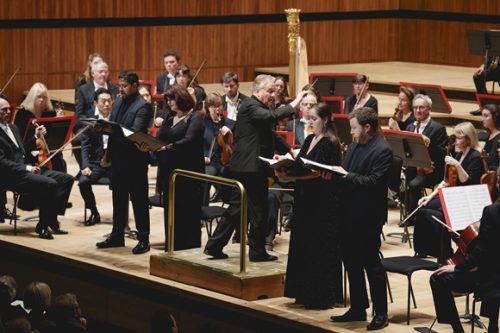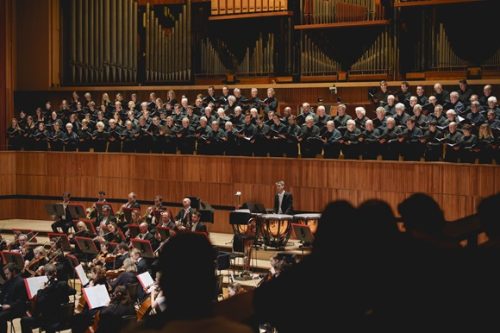 United Kingdom Coleridge-Taylor, Beach, Brahms: Claire Rutter (soprano), Katherine Gregory (mezzo-soprano), Harry Jacques (tenor), Ross Ramgobin (bass), The Bach Choir, Philharmonia Orchestra / David Hill (conductor). Royal Festival Hall, London, 2.11.2023. (JR)
United Kingdom Coleridge-Taylor, Beach, Brahms: Claire Rutter (soprano), Katherine Gregory (mezzo-soprano), Harry Jacques (tenor), Ross Ramgobin (bass), The Bach Choir, Philharmonia Orchestra / David Hill (conductor). Royal Festival Hall, London, 2.11.2023. (JR)

Samuel Coleridge-Taylor – Solemn Prelude
Amy Beach – The Canticle of the Sun
Brahms – Ein deutsches Requiem, Op.45
Brahms’s German Requiem is only 75 minutes long, so finding additional works to fill a first half of a concert is no simple task. David Hill, musical director of The Bach Choir for 25 years, hit upon two appropriate works. The first, by Samuel Coleridge-Taylor, opened the concert. Coleridge-Taylor, born in 1875 to a Sierra-Leonean father and a British mother, achieved popularity largely because of his cantata Hiawatha’s Wedding Feast (he named his son Hiawatha). He was championed by Elgar, who recommended to the Three Choirs Festival that they commission a work from Coleridge-Taylor. The result was the Solemn Prelude, composed in 1899. The work was performed, but never published, but the orchestral parts were then lost. Planning for the Three Choirs Festival in 2021, the programmers had the idea of revisiting the work. The performance by the Philharmonia Orchestra and The Bach Choir under David Hill was very well received in Worcester Cathedral (review here) and so this concert was an ideal opportunity to perform the work in London. It demonstrates the influences of late Romanticism, and whilst it is full of rich harmonies it has no real discernible melody of any length. It is emotionally intense, of course sombre in style. It has the unmistakeable influence of Elgar and possibly Rachmaninov, indeed the first bars could have been written by Elgar himself. The work is very well worth hearing but received no more than polite applause. The majority of the audience, family and friends of choir members, had, I suspect, only come to hear the choir and the Brahms.
The choral work by Amy Beach, The Canticle of the Sun, sets a text of the same name written by St. Francis of Assisi in 1224. The fine work demonstrates Beach’s chromaticism and her skill in writing rich choral music. The piece has its moving moments, and the ending is particularly lovely. The choir clearly enjoyed the work and did it proud. The four soloists played their part, though I felt there was too much vibrato from the soprano Claire Rutter.

The Bach Choir, for this concert, numbered a staggering 185 singers: according to the programme 64 sopranos, 55 altos, 29 tenors and 40 basses. I expected them to make a truly massive sound and consequently was a little disappointed. The German Requiem only really has loud sections in ‘Denn alles Fleisch’ on the second and third repeats, and in ‘Herr, du bist würdig’; I expected to be blasted out of my seat and wasn’t. I fear the dry acoustics of the Royal Festival Hall were partly to blame. The orchestra – what a luxury to have the Philharmonia – kept a fairly low profile; only the woodwind stood out, the principal oboe (Timothy Rundle) in particular. The choir’s diction was faultless though they struggled with ‘spricht’ in ‘Ja, der Geist spricht’, a very difficult combination for Anglo-Saxon tongues with the ‘schpr’ and ‘ich’ sounds. I compare it to the difficulty Germanic choirs have when singing ‘th’ in English, where ‘the mouth of the Lord’ quickly becomes ‘the mouse of the Lord’.
The choir certainly had ample volume and stamina when required, for example in ‘wie soll ich mich trösten’ and in ‘Preis und Ehre und Kraft’, though, for balance, the tenors occasionally could have done with some more singers. The sopranos hit their high notes with ease, no hints of scratchiness. Basses were particularly impressive. There were oddly quite a few heads buried deep in the score (particularly member of the choir, I think a bass, who never once seemed to look up), a sign that these singers often only get to rehearse for a couple of months to get on top of these major works and the works don’t get under their skin for some of them. ‘Denn wir haben hie keine bleibende Statt’ could have done with a little extra bite. However, in the opening and closing quiet sections ‘Selig sind’, the choir sang wonderfully together and to great effect, evoking plenty of pathos. David Hill marshalled his forces well and controlled the dynamics to perfection, especially in the closing pages.
Which brings me, finally, to the two soloists; I am afraid to say neither impressed. Claire Rutter sometimes had me guessing the note; she is best known for performances in opera. Baritone Ross Ramgobin lacked presence, character and heft in his voice. ‘Siehe, ich sage euch ein Geheimnis’ should have been a highlight and lacked warmth.
The Bach Choir now moves on to perform a whole evening of John Rutter at St. Paul’s Cathedral on November 15th, concluding with his Requiem. Bach’s St. Matthew Passion will be performed on March 17th (with Florilegium) at the Festival Hall and The Dream of Gerontius on 16th May. David Hill is certainly celebrating his 25th year with some choral masterpieces.
John Rhodes
